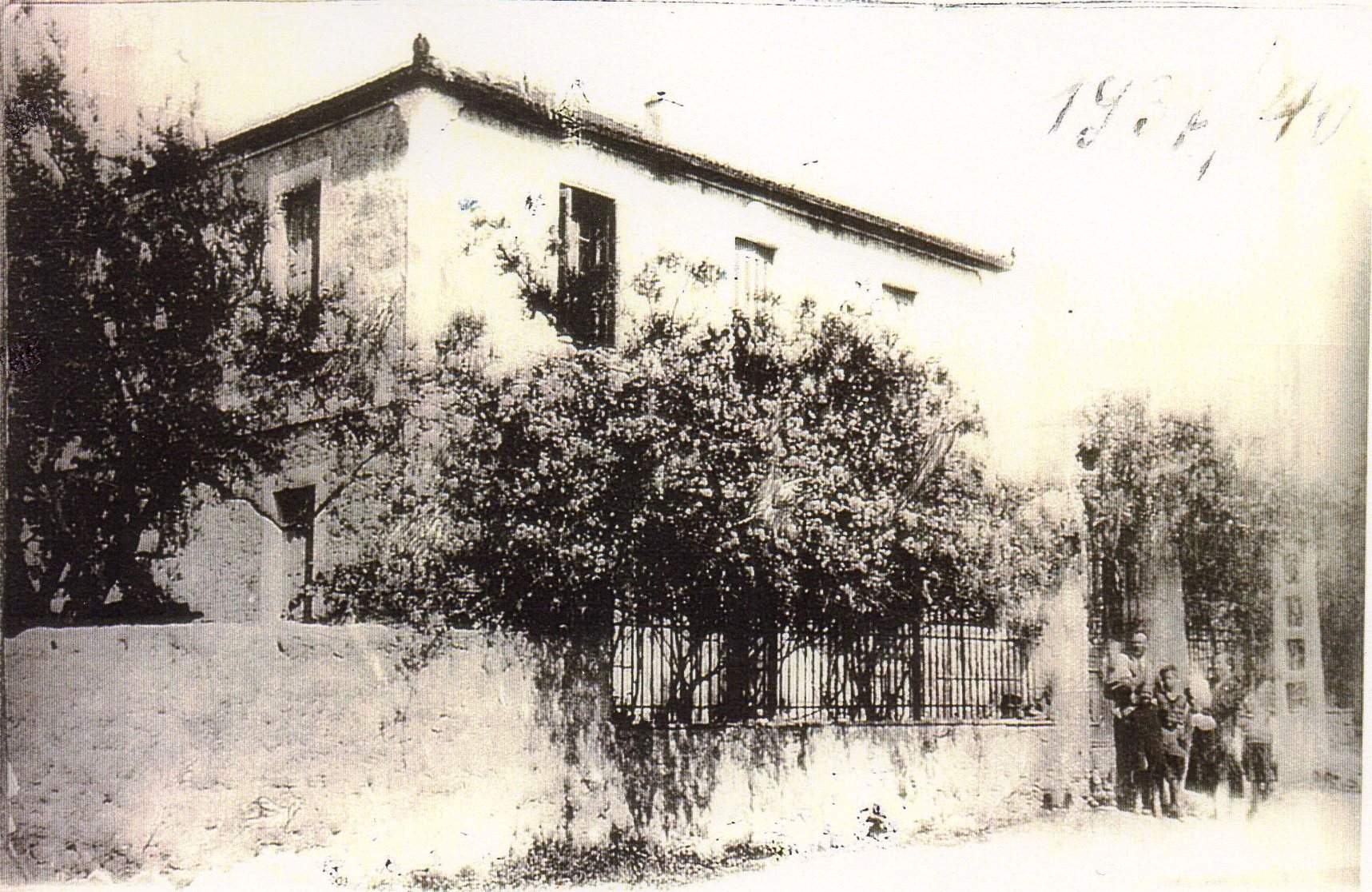
Paleo Iraklio
Family Histories of Παλαιό Ηράκλειο Αττικής: The Original Bavarian Colonists and their Descendants
Introduction
This website is devoted to the mid-19th century Bavarian colony of “Arakly” or Paleo Iraklio, Greece. What began as as a genealogical effort to discover the roots of my ancestors, quickly became a project to reconstruct the family tree of the small group of original settlers who founded this village in Greece that has become what is known today as Παλαιό Ηράκλειο Αττικής Greece. My ultimate goal is the comprehensive family tree of all descendants and ancestors of this settlement.

Today Paleo Iraklio is known as Iraklio Attikis, to distinguish it from its popular namesake city in Crete. It is a suburb of Athens, Greece situated approximately 10 km northeast of the Acropolis and surrounded by the current suburban districts of Metamorfosis, Lykovryssi, Maroussi, and New Ionia. To this day, descendants of those original colonists can be found in the very location of its initial establishment. The companion family tree associated here represents an attempt to trace the family roots of most of the descendants of the Bavarian settlers. It is an ongoing project and I welcome any comments or information that can add to this story. I hope this website will serve as a repository of useful information about Paleo Iraklio, its history, its initial settlers, and their descendants.
This website has been inspired by and is a proud member of the The Village History Projects Initiative (VHPI) of Greek Ancestry, a platform that encourages projects centered on genealogical and historical aspects with a focus on Greek villages.
History of Paleo Iraklio
After the upheaval that ensued after the revolution of 1821 and the subsequent replacement of Ottoman control, Greece went through a period of economic and social turmoil. The Great Powers at the time England, France, and Russia proposed the establishment of a Monarchy to lead Greece through this difficult period [26, 27]. A son of the Bavarian King Ludwig I was chosen to lead Greece and a contingent of military men, advisors, and skilled tradesmen accompanied the young king to Greece. In 1837, the newly established King Otto I of Greece ordered by decree, permanent residence to a select group of 31 military men and their families. Land and economic assistance were provided. Thus, the Bavarian military colony in Iraklio Attikis was founded. In 1842 King Ludwig of Bavaria ordered the construction of the Catholic church of St. Luke (Agios Loukas) in the Gothic tradition and was designed by the Bavarian architect Theophilus Hansen. Inaugurated in 1845, the church served the fledgling Bavarian community and is still an important centre of Catholicism in Athens.
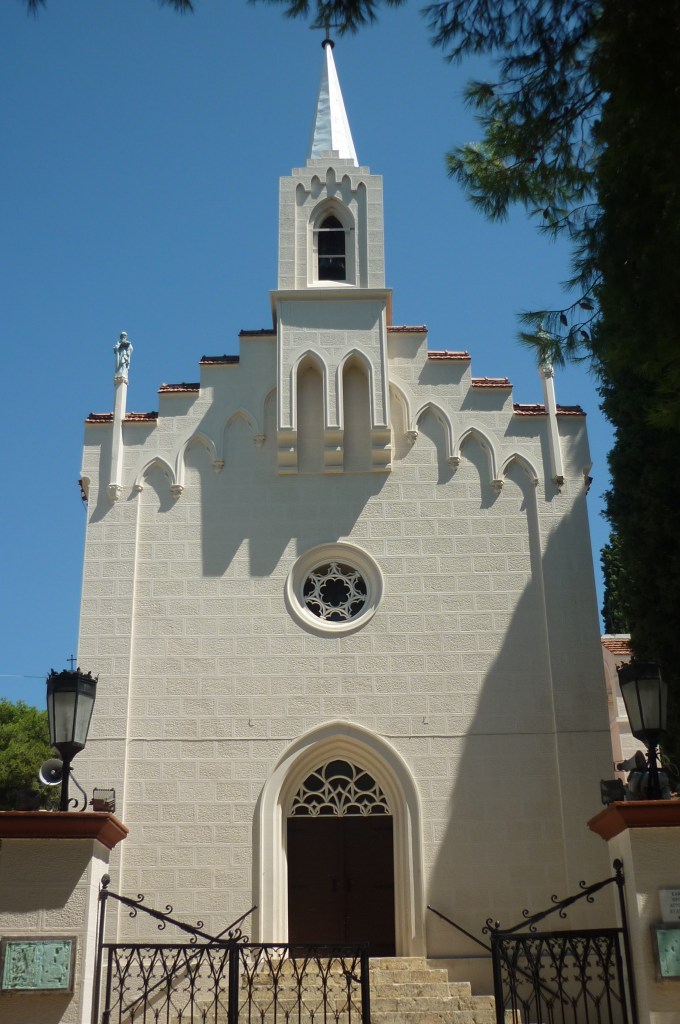


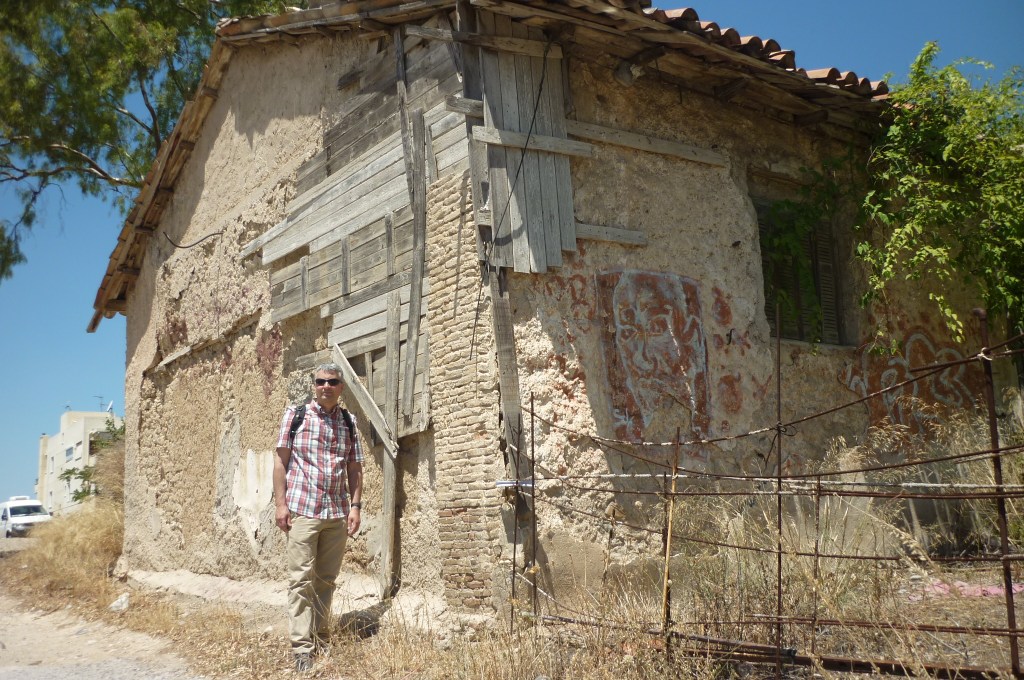
How my Research Began
My research project began in 2016 when I was gifted a copy of a book by village historian G. Rossolatos, a photographic chronicle of the history of Paleo Iraklio [5]. This along with a copy of a book by Maltezos [4], provided me with the inspiration to investigate my ancestral roots. Growing up in a family with both Greek parents, I quickly realized that my surname was indeed not Greek and I struggled to understand the paramythia that were told to me about a Bavarian prince having ruled Greece along with his entourage that included some forefather named Wagner. With the power of modern day information technology, I began my journey and it continues till this day. I hope this website serves as an important educational tool and sheds light on this poorly understood aspect of modern Greek history.

The Family Tree
The heart of this project continues to be the maintenance and completion of a family tree that would account for all of the original Bavarians of Paleo Iraklio and their descendants. Since Agios Loukas church was the centerpiece of religious activity of the colony, it is reasonable to assume that the baptism, wedding, and death records of this church would be a valuable source of information. Indeed, these records, which were photographed in 1982 and were made available via Familysearch microfilm loan program, are the singular most important database for the tree [13]. The information from these records were extracted and comprise the majority of the individuals that appear in the genealogical tree. The tree is too large to properly display on the is website but it is actively maintained as a MyHeritage tree that is viewable online.

Wagner or Wanger?
One of the surprising aspects that was uncovered during my research was the realization that the spelling of my surname Wagner is not the one that belonged to my direct ancestor Phillipus Peter Wanger. Current day descendants of this forefather usually spell the name as “Βάγγερ”, which is actually the closest transliteration to Wanger or “Vanger”. Over the years, poor transcriptions and mispronunciations lead to the adoption of the form Wagner by my immediate family. Historical records including Bavarian ones confirm the proper spelling as Wanger, a legitimate Bavarian surname although not as common as Wagner. As one native German native once told me: no self-respecting German would confuse the two names.
Holy Grail Moment
A “Holy Grail” moment can be defined as the occasion when an important discovery takes place that either defines a new direction or creates an valuable link that connects two events or resources. This occured in the summer of 2017, after spending countless days browsing GAK records [7, 8] handwritten, often in German, that were identified previously [4], I came across a record with an identifiable name. Since I could not read German, I asked the help from online forum specializing in transcribing German genealogical records, and to my amazement this was the transcription and subsequent translation of the second paragraph:
Ertheilt das königliche Land Commissariat, in Gemäßheit aller höchster Verordnung vom 17ten Dezember 1825. dem Philipp Peter Wanger, Winzer aus Mußbach, nebst seinen Ehefrau Sara Rieder, und seinen vier Kindern, als: Barbara, geboren 1824, Joseph, geboren 1827, Appolonia geboren 1832 und David geboren 1837. hierdurch die Entlassung aus dem königlichen baierischen Unterthansverbande, zum Behufe der vorhabenden Auswanderung nach Griechenland.
Delivered to the royal commissariat, in accordance with all the highest order of December 17, 1825. Philipp Peter Wanger, a winemaker from Mußbach, together with his wife Sara Rieder, and his four children: Barbara, born 1824, Joseph, born 1827, Appolonia born 1832 and David born 1837. By this means the dismissal from the Royal Bavarian Association of Undertakings for the purpose of the emigration to Greece.
This Royal decree not only identifies my G-G-G Grandparents, their children, their birthdates and original ancestral Bavarian village, it also certified their existence in Greece. This document was the valuable bridge to Bavarian genealogical records and allowed me to explore my roots beyond the borders of Greece.
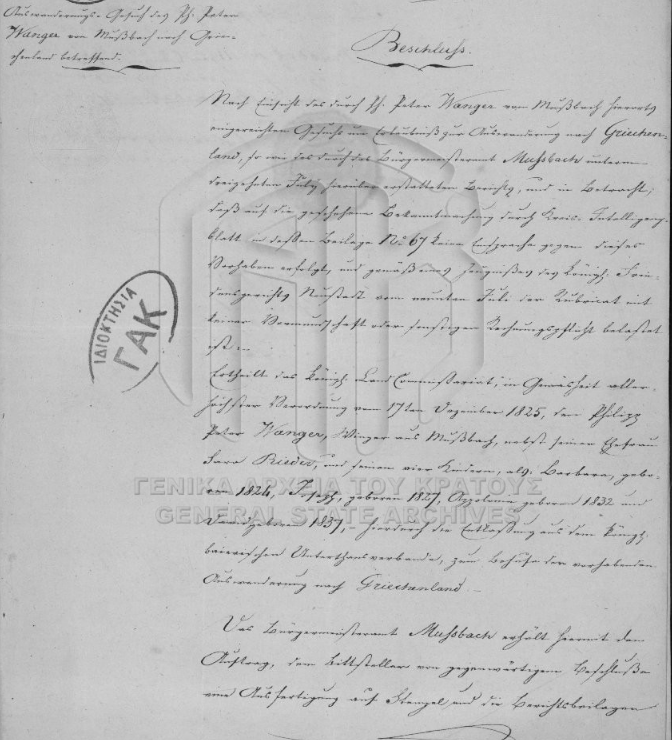
The 31 Colonists
The names of the 31 original colonists appear in Maltezos [4] and in a record located in the General State archives of Greece [7, 8]. Most likely Maltezos transcribed the names from the same record but there are some naming discrepancies that are listed below. The list was compiled in 1837 and lists their names as well as compensation that was allotted to each settler. There is evidence to suggest that deaths, defections, and subsequent replacements resulted in a population that fluctuated during the early years of the colony. The table also indicates whether the names appear in church records, the family tree, or have a direct ancestral connection to the author.
| # | Colonists names appearing in Maltezos [4] | Colonists names appearing in GAK [8] | appearing in Ag. Loukas records | appearing in tree | direct ancestor |
| 1 | Ruff Johann | Ruf Johann | |||
| 2 | Wanger Peter | Wanger Peter | yes | yes | yes |
| 3 | Jaumann Leonhardt | Jaumann Leonhardt | yes | yes | |
| 4 | Klinzler Johann | Klinsler Johann | |||
| 5 | Ehrhard Franz | Ehrhard Franz | |||
| 6 | Dölser Joseph | Dölser Joseph | yes | ||
| 7 | Wüstner Xaver | Wüstner Xaver | |||
| 8 | Kegelmann Joseph | Kogelmaier Joseph | yes | yes | |
| 9 | Töpfner Joseph | Döpfner Joseph | yes | yes | |
| 10 | Schäffner Joseph-Peter | Schefner Joseph-Peter | |||
| 11 | Eibel Joseph | Eibel Joseph | |||
| 12 | Hahn Franz | Hahn Franz | |||
| 13 | Kirner Joseph | Kirner Joseph | yes | yes | yes |
| 14 | Rudhard Johann-Ottmar | Rudhard Johann-Ottmar | |||
| 15 | Sürsen Heinrich | Sürfsen Heinrich | |||
| 16 | Kreil Franz | Krail Franz | |||
| 17 | Wentzel Georg | Wetzel Georg | yes | yes | |
| 18 | Scheuerl Joseph | Scheuerl Joseph | |||
| 19 | Huber Mathias | Huber Mathias | |||
| 20 | Taglauer Andreas | Taglauer Andreas | yes | ||
| 21 | Fuchs Anton | Fuchs Anton | |||
| 22 | Saetz Simon | Setz Simon | yes | yes | yes |
| 23 | Haselbacher Georg | Haselbacher Georg | |||
| 24 | Bittlinger Johann | Bittlinger Johann | yes | yes | yes |
| 25 | Reiss Johann | Reiss Johann | yes | ||
| 26 | Edelmann Andreas | Edelmann Andreas | |||
| 27 | Ellmauer Franz | Ellmauer Franz | |||
| 28 | Thigler Wilhelm | Hiegle Wilhelm | |||
| 29 | Müller Franz | Müller Franz | yes | yes | yes |
| 30 | Neiding Kaspar | Neuding Kaspar | yes | yes | yes |
| 31 | Amerhein Jos Ad | Amrhein Adam | yes | yes |
Correcting the False Myths
The following are some misconceptions encountered by the author either documented in resources or in articles written about the Bavarians:
The Bavarians in Greece were quickly assimilated into Greek customs and traditions
There is no evidence to suggest that the first generation Bavarians either fully assimilated into Greek culture or actively resisted any attempts at integration. There is a complaint recorded in Seidl’s book [23] that the colony’s midwife, Mrs. Taglauer, registered her displeasure that as early as 1863, nearly 25 years after the establishment of the colony, the younger generation could only speak and write German with difficulty. What is certain is that Roman Catholicism remained as the cohesive force that resisted the Greek influence despite the quick loss of the German language parlance and education. The influx of Greek speaking, Catholic families of Syros and Malta into the colony assured the disappearance of the German language from the colony but cemented the survival of the Catholic religion, which thrives even to this day.
The surnames of Bavarians were Hellenized
There is no clear information to indicate there was an effort to Hellenize or mask the Bavarian surnames of the colonists. Nor is it clear that the Bavarian names were changed to render them easier to pronounce in the Greek language. What is clear is that poor translation efforts when transcribing names onto official records resulted in spellings and pronunciations that differ from the originals. The classic example is the case of the surname “Fix” , the founder of the beer brewing dynasty. A common folklore that is repeated is that Fix was transliterated from “Fuchs” in an effort to make it easier for Greeks to pronounce properly. However, given that both Fix and Fuchs are legitimate Bavarian surnames, it appears that this is not the case. Indeed, Ottonian period records refer to district individuals with the surnames Fuchs and Fix. Also, published genealogies of the ancestors of the beer brewing dynasty clearly refer to Fix not Fuchs.
“Boatloads” of young girls from Syros arrived in Paleo Iraklio to marry Bavarian settlers
This statement appears in an account by Seidl [23] in describing the influx of immigrants after the establishment of the colony in an apparent attempt to satisfy a shortage of brides for the growing population of young men. It is true that immigrants from Syros and Malta did arrive at the colony but did so as family units, having established roots and maintaining a presence even to this day. The exact motivation for such migration is not known but there was a recorded sudden stretch of marriages recorded at Agios Loukas Church involving Syros and Maltese brides [13].
Bavarians and their descendants exhibited dubious allegiances to Greece during war periods
A heroes monument erected in the courtyard of Agios Loukas Church in Paleo Iraklio serves as a testament to the sacrifices of the descendants of Bavarians of Paleo Iraklio who lost their lives serving their beloved Greece during the campaigns and wars from 1914-1945.
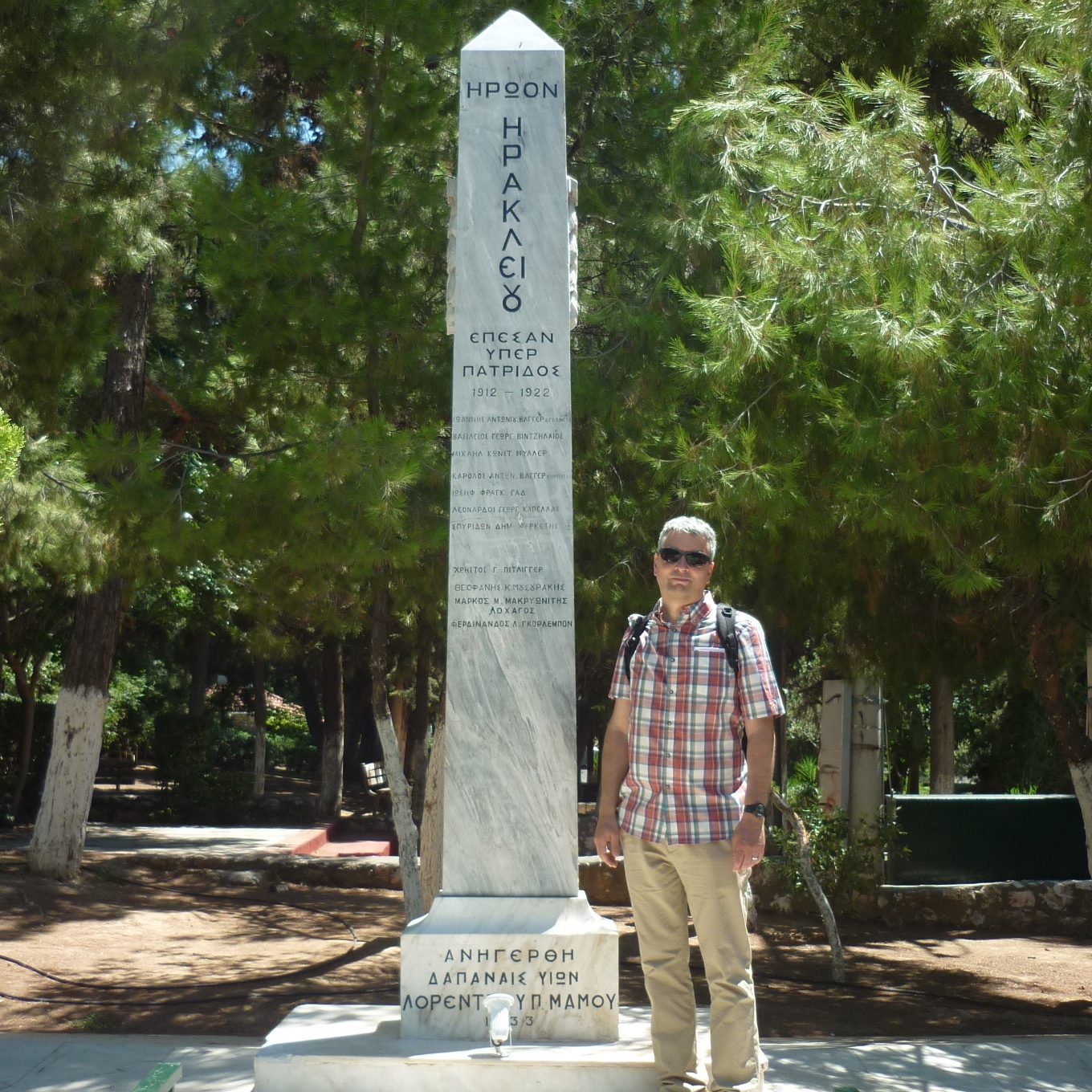
The descendants of the original Bavarians are not really Greek
Some recent online articles about Paleo Iraklio and the descendants of the original settlers refer to the present-day descendants as “Greek-Bavarians” (REF). The authors of the articles fail to mention that present-day descendants are 4-5 generations removed from their bavarian roots and their immediate forefathers were all born in Greece thereafter. Yet the authors of these articles feel compelled to ascribe the qualifier “Greek-Bavarian” as to imply some sort of incomplete or questionable amount of “Greekness” of the individuals. Perhaps this can be due to a lack of a proper way to describe these descendants, or perhaps a failure to understand the history of the descendants. It begs the question as to how many generations of pure Greek DNA must be introduced before the half moniker can be dropped?
Common Questions about the Bavarians in Greece
When did the Bavarian settlers become Hellenized?
Of course this is a question that is not possible to answer as a concrete definition of Greekness or any other nationality remains highly subjective and fraught with controversy. My own answer to this question is to respond that the Bavarian settlers became Hellenized as soon as they stepped foot onto Greek soil.
Did any Bavarians remain in Greece that were not part of the colony?
The vast majority of Bavarian who accompanied King Otto eventually left Greece in favour of the fatherland and the abdication of the king in 1862 virtually assured their disappearance from Greek society. Most of the settlers who had established roots in the colony were reluctant to give up their land and livelihoods. There are many instances of Bavarians who settled outside the Paleo Iraklio colony either as part of minor settlements in Tiryns (Nafplion) or the mining settlement of Kymi in Euboea [17, 20].
Are any of the descendants related to King Otto or Bavarian royalty?
There is no record of any children born to King Otto and Queen Amalia. There are some accounts of some extramarital activity on the part of King Otto, but no evidence of any children produced as a result [27]. It remains possible that some of the settlers may have some ancestral connection to King Otto but this remains to be resolved.
A Family Picture Album
Here is a collection of various photographs that depict my family and their life in Paleo Iraklio. Stay tuned as more pictures will be posted.


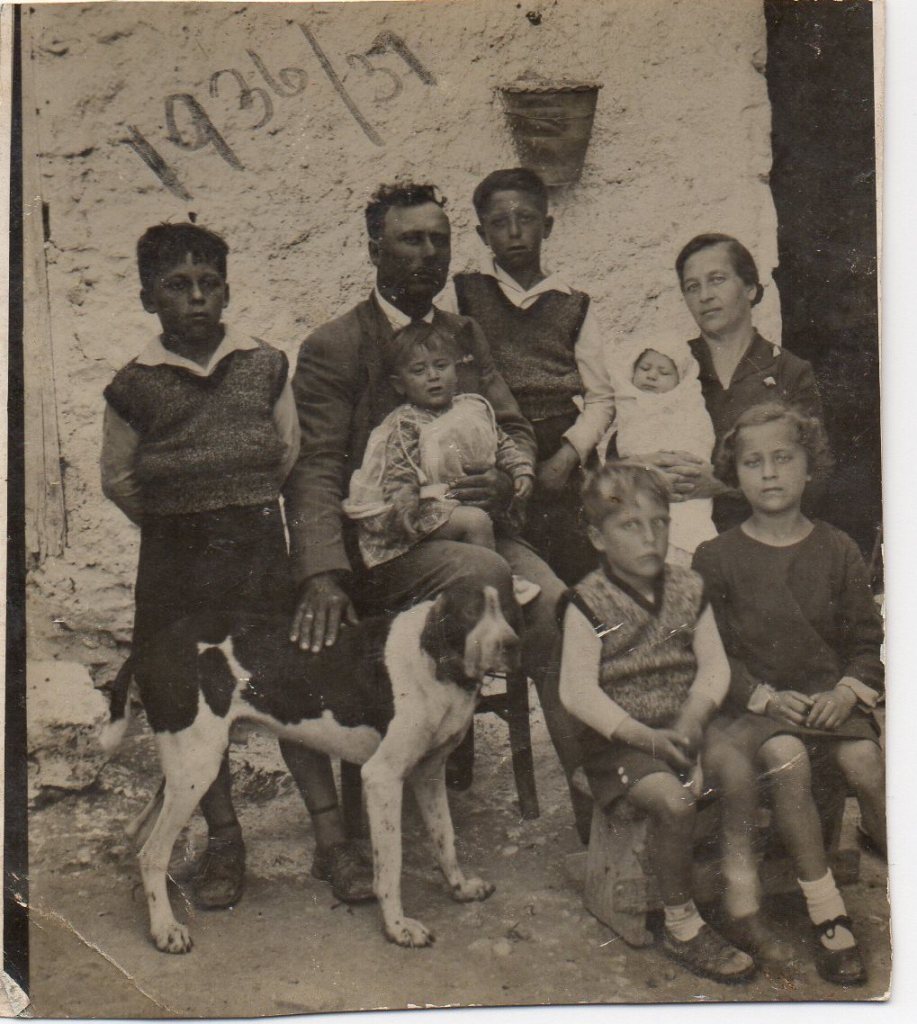
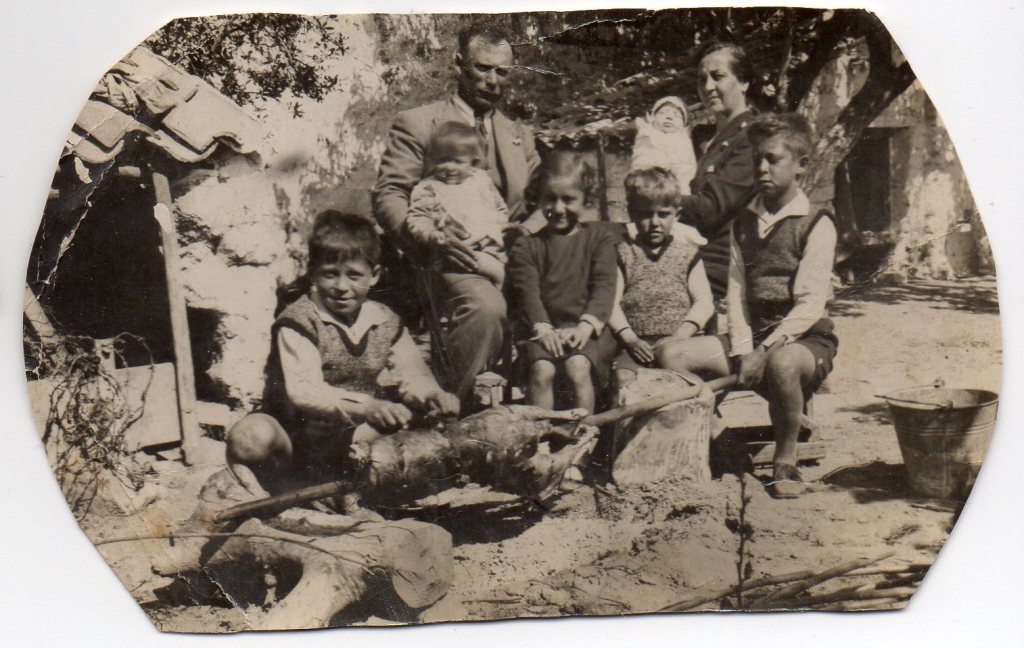
Future Direction
The goal of the project is to continue compiling information about the Bavarian descendants of Paleo Iraklio with an end goal of the complete accounting of all the individuals who comprised the original group. To my knowledge this would be the first undertaking of its kind for this village. This attempt, and the data gathered from it, would have important sociological implications as it would be a rare example of a family tree generated with respect to a village whose inauguration chronology is well established and relatively recent. Among the other goals I hope to achieve:
- Publication of all transcribed birth, baptismal, and death records of Agios Loukas parish from 1845 onwards.
- Greek language translation and publication of this website.
- Hosting of new and user contributed articles that enhance our understanding of the history of Paleo Iraklio.
References
The references listed here are all instrumental in helping shape my research. I have supplied some commentary and context by which these resources have been helpful. Some web resources expertly explain the history of Bavarian influx during the Ottonian period and provide much more detail about this poorly understood aspect of modern Greek history. Perhaps the best and most thoughtful treatment of the history of Bavarians in Greece may be obtained from the blog “GraecoGermanica“, which hosts a series of articles about the personal stories of the first Bavarians [17].
| 1 | John Wagner, Personal communication |
| 2 | Josephine Wagner, Hand-written family tree, ~1990 |
| 3 | Lucy Wagner, Hand-written family tree, date unknown, located 2019 |
| 4 | Μαλτέζος Γεώργιος Θ., «Το χρονικόν του Ηρακλείου Αττικής», Εκδόσεις Ανατολής, 1970. |
| 5 | Γιάννης Ροσσολάτος, Κάποτε στο Παλαιό μας Ηράκλειο, 2009 |
| 6 | Gravestone Inscriptions Καθολικό Νεκροταφείο, Νεκροταφείο Δήμου Ηρακλείου Αττικής, photographed 2017 |
| 7 | General State Archives of Greece, http://arxeiomnimon.gak.gr/browse/resource.html?page=18&tab=tab02&id=8304 |
| 8 | General State Archives of Greece, http://arxeiomnimon.gak.gr/browse/resource.html?tab=01&id=8305 |
| 9 | Deutschland Heiraten, 1558-1929 via FamilySearch.org, FHL microfilm 367,739. |
| 10 | Deutschland Heiraten, 1558-1929 via FamilySearch.org, FHL microfilm 488,302. |
| 11 | Germany, Marriages, 1558-1929 via MyHeritage |
| 12 | Germany, Births and Baptisms, 1558-1898 via MyHeritage |
| 13 | Parish registers, 1846-1952, Catholic Church. Parish of Agios Loukas (Irakleion) (Main Author), Manuscript/Manuscript on Film, Salt Lake City, Utah : Filmed by the Genealogical Society of Utah, 1982, on 1 microfilm reel 35 mm. 1038560 |
| 14 | Ροδολφος Φιξ, Η ΙΣΤΟΡΙΑ ΤΗΣ ΟΙΚΟΓΕΝΕΙΑΣ ΦΙΞ (FIX) ΤΟΥ ΗΡΑΚΛΕΙΟΥ ΑΠΟ ΤΗΝ ΕΠΟΧΗ ΤΟΥ ΒΑΥΑΡΟΥ ΒΑΣΙΛΙΑ ΟΘΩΝΑ ΕΩΣ ΚΑΙ ΣΗΜΕΡΑ (ΨΗΦΙΑΚΗ ΕΚΤΥΠΩΣΗ) , 1998 |
| 15 | Athens First Cemetery Blog, https://athensfirstcemeteryinenglish.blogspot.com/2019/02/the-fix-family-in-greece.html |
| 16 | MLP Blo-G-Spot Blog, http://mlp-blo-g-spot.blogspot.com/2013/06/blog-post_11.html |
| 17 | Graecogermanica Website, http://www.graecogermanica.gr/index.php/el/istologio/item/78-germanoi-anthrakoryxoi-stin-kymi |
| 18 | Wikipedia Entry, https://el.wikipedia.org/wiki/Οικογένεια_Φιξ |
| 19 | Greek and linked European Families, Family Tree Website: Death notice appearing in, https://stevenzannos.tribalpages.com/ |
| 20 | SAPOUNAKI-DRACAKI L. & DEMATHAS Z., U. Athènes (Grèce), Bavarian immigrants in Evia (Euboea). A privileged minority in 19th century, European Association of Urban Historians, SECONDE CONFERENCE INTERNATIONALE D’HISTOIRE URBAINE, 8-10 septembre, 1994, STRASBOURG |
| 21 | Διεύθυνση Ιστορίας Στρατού, https://dis.army.gr/en |
| 22 | Greek Ancestry Website, https://greekancestry.net/ |
| 23 | Seidl, Wolf. Bayern in Griechenland: die Geburt des griechischen Nationalstaats und die Regierung König Ottos. Germany, Prestel, 1981. |
| 24 | Siegfried Mackroth, Das deutschtum in Griechenland Siegfried Mackroth Ausland und heimat verlags-aktiengesellschaft, 1930 |
| 25 | Augsburger Postzeitung, 7.9.1849 |
| 26 | Clogg, Richard. A Concise History of Greece. United Kingdom: Cambridge University Press, 1992. |
| 27 | Wikipedia Entry https://en.wikipedia.org/wiki/Otto_of_Greece |
| 28 | Οι βαυαροί στην Ελλάδα https://www.youtube.com/watch?v=ydYXnelV94M&t=30s |
Acknowledgements
None of this research would have been possible without the documented resources that have been amassed over the years by authors and historians. Their love of history has enabled them to bring to light a poorly covered aspect of the history of Greece. Most of their names can be found in the References section. Thank you to Giannis Rossolatos the rightful village historian whose publication [5] proved to be an invaluable resource as well as his many answers to my questions. A special thanks to Gregory Kontos and Carol Kostakos-Petranek for creating the Village History Projects Initiative that served as the inspiration for the publication of this website. The Village History Projects Initiative (VHPI) is a platform created and encouraged by Greek Ancestry that compiles historical and genealogical projects related to specific villages in Greece. Anyone researching their family tree with a focus on an ancestral Greek village are encouraged to join this exciting initiative [22].
About the Author
Bavarian descendant John Wagner was born and raised in Montreal, Canada, the chosen homeland of his immigrant parents who both arrived separately from Greece during the 1950’s. His father, grandfather, and 7 aunts and uncles were all born in Paleo Iraklio and all immigrated to Canada during the same period. John earned his B.Sc. and M.Sc. in biological sciences from McGill University and has spent >30 years in health science research. He continues to pursue genealogy projects that help him understand his Greek and Bavarian roots and hopes to help others understand this aspect of Greek history.

Dedication
This website is dedicated to my late father, Richard Wagner, who passed away in 2013. A copy of G. Maltezos’ book sat by his bedside during his last years, but I never understood or appreciated the significance of this book or the well thumbed pages where the name Wagner appeared. That was my father’s attempt to understand the history of his forefathers. Unfortunately, he passed away without knowing the amazing information I have been able to discover after continuing his quest with the help of modern resources. To this day it remains my biggest regret that I began this genealogical journey too late for my father to appreciate. I hope this website may help other Bavarian descendants like myself to understand their history and their roots.
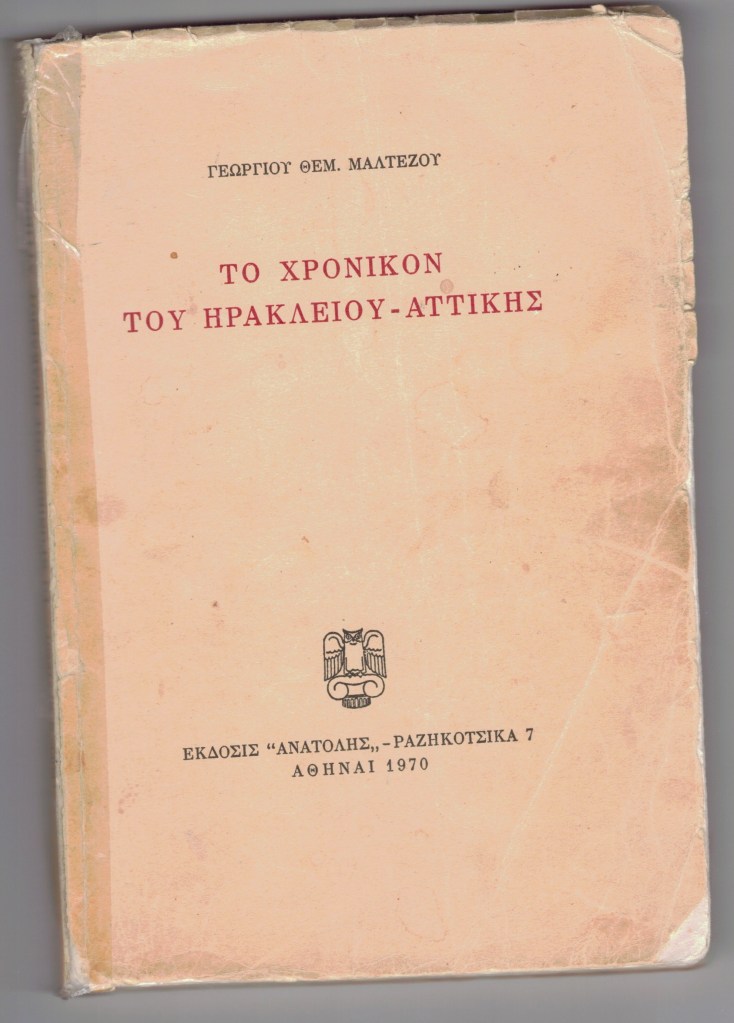

Contact
The research presented here is an on-going project and I would be pleased to hear comments, questions, and suggestions that can add to the information about this topic.
NOTE: The material and information on this website is covered under copyright protections and is intended for informational use only. Every attempt has been made to ensure the accuracy of information, but errors may occur. The material and information provided here may not be reproduced in whole or in part without the expressed written consent of the author. © John Wagner 2025
